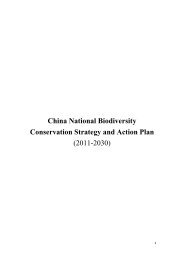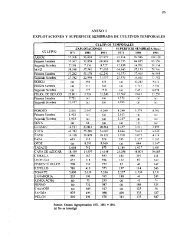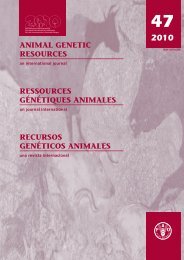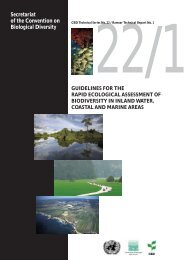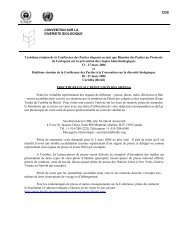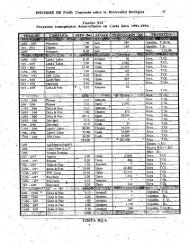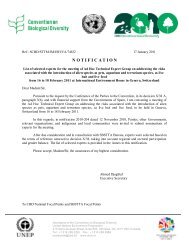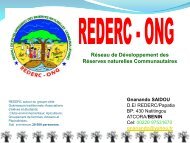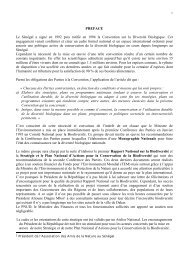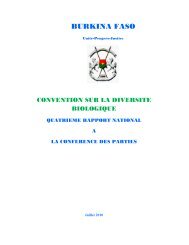English - Convention on Biological Diversity
English - Convention on Biological Diversity
English - Convention on Biological Diversity
Create successful ePaper yourself
Turn your PDF publications into a flip-book with our unique Google optimized e-Paper software.
COUNTRY STUDY FOR BIODIVERSITY OF THE REPUBLIC OF MACEDONIA<br />
the past several years. It has resulted in the current insufficient level of development and<br />
a lack of modern technical knowledge and technologies. A comparis<strong>on</strong> of data <strong>on</strong> the<br />
levels of railway development from 1937 and 1996 shows that progress was actually<br />
greater in 1937, indicating a 50-year period of stagnati<strong>on</strong>. In 1937, Maced<strong>on</strong>ian railways<br />
were in full compliance with the European regulati<strong>on</strong>s of that time c<strong>on</strong>cerning stability<br />
and speed of transportati<strong>on</strong>, which is not currently case. The outdated technology used<br />
by the railways reduces, to a great extent, their stability and speed of the transport.<br />
Another major problem faced by the transportati<strong>on</strong> sector is its c<strong>on</strong>figurati<strong>on</strong>, that is,<br />
the routes of the main transportati<strong>on</strong> lines. Due to Maced<strong>on</strong>ia’s multi-decade existence<br />
within the c<strong>on</strong>fines of a wider community (the former Socialist Federal Republic of<br />
Yugoslavia [SFRY]), its overall transportati<strong>on</strong> infrastructure is characterised by marked<br />
development of the main, north-south corridor (a part of European Corridor 10). In<br />
c<strong>on</strong>trast, the east-west corridor (part of European Corridor 8) has been almost<br />
completely neglected. The period following the independence of Maced<strong>on</strong>ia (with its<br />
accompanying problems) has shown that both of these corridors are equally important in<br />
the development of its transportati<strong>on</strong> infrastructure. For example, the closure of the<br />
border with Serbia and M<strong>on</strong>tenegro and the blockade by Greece during the early 1990s<br />
resulted in extremely adverse impacts to the Maced<strong>on</strong>ian ec<strong>on</strong>omy.<br />
Despite all of these problems, transportati<strong>on</strong> as a sector has been gradually increasing<br />
its c<strong>on</strong>tributi<strong>on</strong> to the GDP over the last several years. Thus, from a 6.1% GDP share in<br />
1997, its share increased to 7.3% in 1998 and to 8.2% in 1999.<br />
5.8.2. Changes in the sector over time<br />
With reference to the structural changes underg<strong>on</strong>e by the transportati<strong>on</strong> sector,<br />
especially after the independence, the main trends seen internati<strong>on</strong>ally are also present<br />
within Maced<strong>on</strong>ia. More specifically, in parallel with development, the transport of<br />
goods and passengers has been carried out less frequently by railways, and more often<br />
by road vehicle traffic. During the course of the last several years, air traffic has gained<br />
in importance, especially with regard to passenger transportati<strong>on</strong>. The development of<br />
new oil and gas pipelines should also c<strong>on</strong>tribute to the development of the pipeline<br />
transportati<strong>on</strong> sector.<br />
The current status of railway traffic is far from satisfactory. The length of the lines<br />
has been stagnating for the last 15-20 years. A comparis<strong>on</strong> with some developed<br />
countries shows that Maced<strong>on</strong>ia has a relatively low density of railway networks (27 km<br />
of railway lines per 1,000 km 2 , i.e., 339 km of lines per milli<strong>on</strong> inhabitants).<br />
The air traffic sector has experienced sudden growth in the Republic of Maced<strong>on</strong>ia<br />
during the period after its independence and the beginning of its transiti<strong>on</strong>. The general<br />
assessment of this sector is not satisfactory, however, when taking into account the<br />
c<strong>on</strong>stant problems resulting from unsettled c<strong>on</strong>diti<strong>on</strong>s.<br />
Telecommunicati<strong>on</strong>s systems in Maced<strong>on</strong>ia are poorly developed. Full digitalisati<strong>on</strong><br />
of the telecommunicati<strong>on</strong>s network in the country has not been completed, mobile<br />
teleph<strong>on</strong>e service does not cover the entire country etc.<br />
5.8.3. Impact <strong>on</strong> biodiversity<br />
The transportati<strong>on</strong> sector impacts biodiversity through the fragmentati<strong>on</strong> of habitats,<br />
as well as through air polluti<strong>on</strong> and noise. C<strong>on</strong>sidering the current circumstances in the<br />
Republic of Maced<strong>on</strong>ia, these impacts are low by comparis<strong>on</strong> with those of developed<br />
101



